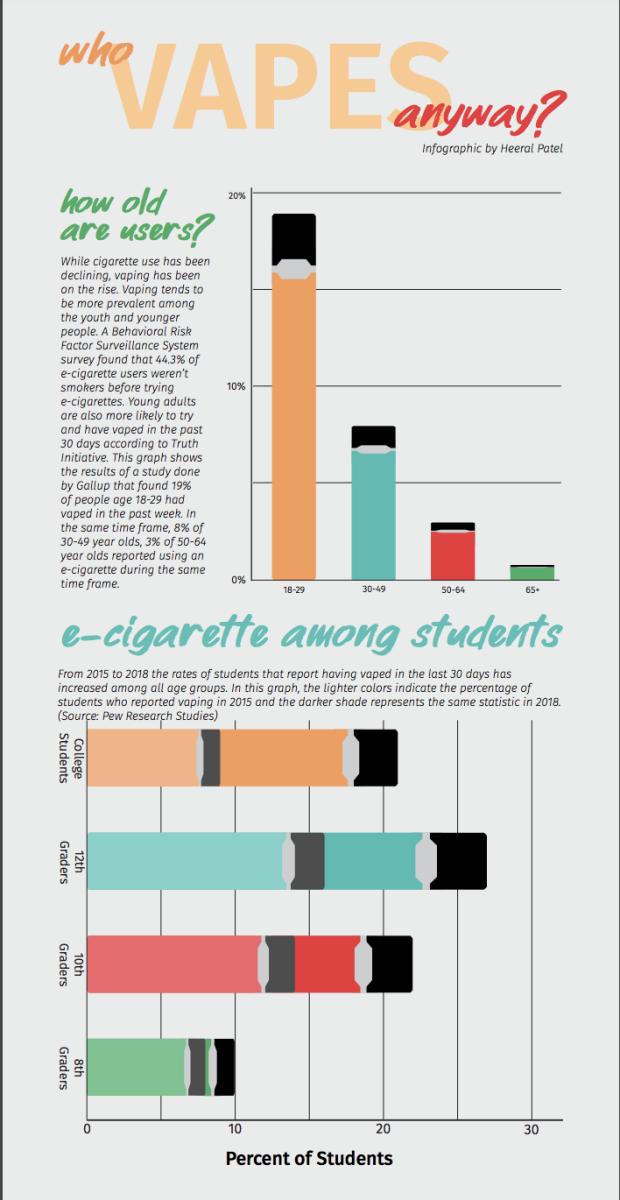Cigarette smoking rates are down in Missouri and nationwide, recent analysis shows, but the surge of vaping has presented an entirely new set of problems for those who seek to reduce nicotine use.
Quote Wizard, an insurance analysis division of Lending Tree, examined CDC data on smoking and vaping in the United States from 2009 to 2018. They reported that there has been a nationwide 10% decrease in cigarette use over that time, but that vaping has increased by 8%.
The data also showed that Missouri had seen a 16.02% reduction in smoking, but a 12% increase in vaping. Missouri ranks No. 13 in terms of largest difference between smoking decrease and vaping increase. This ranking is meant to show how much a state has seen its nicotine users switch from cigarettes to vaping, according to Quote Wizard analyst Adam Johnson.
New Jersey has seen the most dramatic transition from smokers to vapers, while Louisiana ranked last, having seen a decrease in both categories.
While many of the companies that produce and sell vape products will tout this transition as a positive change, Jenna Wintemberg, professor at the MU School of Health Professions, sees this change as problematic, especially for young people. She sees the fast growth of vaping as undoing many of the gains that health professionals have made to decrease nicotine use.
“Public health and medical professionals have spent decades educating young people about the harms of smoking and advocating for strong and comprehensive restrictions,” Wintemberg said.
Wintemberg said that another major concern is that people who would otherwise never be exposed to nicotine will start vaping at a young age and may pick up cigarette smoking down the line.
“There is already evidence that this is happening,” Wintemberg said.
According to Wintemberg, a 2018 National Academy of Medicine report found evidence that e-cigarette use is correlated to the frequency and amount of cigarette smoking in the future.
One hope for reducing nicotine use shared by Johnson and Wintemberg is through legislation. Johnson said that the Affordable Care Act allows insurance companies to charge people more if they are cigarette smokers, but that current FDA regulations have not pushed insurance companies to do the same for those who vape.
“It’s likely that if regulation and laws are passed at the federal level, insurance companies will follow suit,” Johnson said. “That could mean treating e-cigarette use similar to how traditional smokers are in terms of increased health insurance premiums.”
Wintemberg is pushing for revisions to Missouri’s state tax laws, which currently do not allow for e-cigarettes to be taxed as tobacco items.
“This needs to change,” Wintemberg said.
Additionally, she would like to see further regulation on what vape products can be purchased and by whom.
“There is compelling evidence that youth use flavored vapes and tobacco products,” Wintemberg said. “All flavors, including mint or menthol, should be banned to deter youth use.”
Johnson and Wintemberg both said they hope, through incentives like taxes, insurance costs and increased government regulation, nicotine use can be reduced across the board, rather than just shifted to a different delivery method.
_Edited by Alex Fulton | [email protected]_














